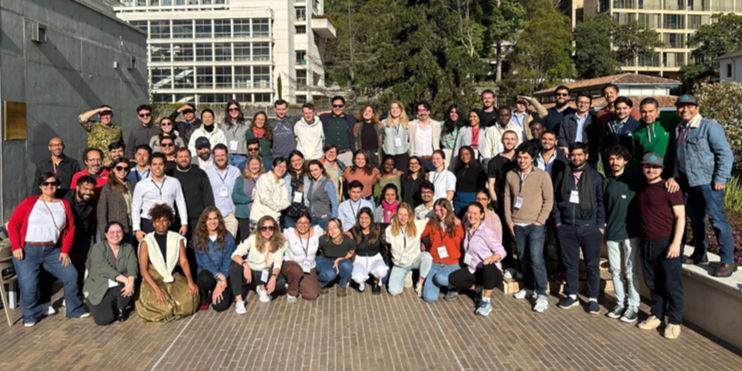The Power of Interdisciplinary Collaboration: Insights from the 2024 Complexity Summer School
- Joseph Martínez
- Aug 29, 2024
- 4 min read
Updated: Sep 20, 2024
What happens when you put together 60 scholars and practitioners from different disciplines and more than 22 countries? You get the most amazingly diverse and remarkable conversations, memories, and ideas! And well, that is exactly what happened during the 2024 Complexity Summer School (CGS) in Bogotá, Colombia, organized by the Santa Fe Institute (SFI) and held in la Universidad de los Andes (Uniandes). This intensive, 12-day program provided immersive exposure to the latest complex methods, models, and frameworks for thinking about economics and governance.
The objective of the school was clear: generate ideas! The crazier the better! And being in an academic setting these ideas had to make their way to actual projects; therefore, the tangible outcome was to work in groups after the workshop during the Fall on interdisciplinary research projects that could bring those ideas to fruition. With the Summer school recently finished, and in the first weeks of working on my project, I can tell you three key elements that I believe helped CGS reach its objective:
1. Making interdisciplinary conversations a daily habit
Our routine during the two weeks of school included (more or less): breakfast, peer-to-peer sessions, lunch, ask-me-anything sessions, and lessons led by faculty on specific topics. Basically during the whole day we interacted with new people during every event, even outside of the normal working day. This sets up the perfect atmosphere to discuss and brainstorm. About what? About everything! This means almost no limits on what you can talk about and the ideas that could be generated. And since all of us were staying in the same building, we could talk with peers and faculty at breakfast, at the sessions, during coffee breaks, everywhere…
2. Getting to know your peers in informal activities
The fact that you could go with peers for self-organized dinners, to get a coffee, even to play tejo (a traditional Colombian sport), makes a huge difference fostering an environment where interdisciplinary research can thrive because, even if no conversations about research were held, you get to know the other participants on a personal level. This is particularly important for working on a group project. Through informal activities, you learn who you have more affinity to work with. Also, it allows you to know other participants’ interests outside of their research fields and their careers. With this, it is easier to build conversations with them, and, if convincing, progressively move discussions towards research. These informal interactions played a key role in the team formation.
3. Removing hierarchies among participants
While graduate students, practitioners, faculty members, and independent researchers attended, we all felt we were on the same level, and we all had the same opportunity to talk to each other. Everyone was called by their first name-- no “Dr.” or “Mr.” or “Ms.” were used the whole time; no one wore fancy suits; and even the faculty would attend the sessions with us. I believe this was a crucial approach to get the attendants to interact with the faculty because one could ask any questions or have any discussion without unnecessary protocols or barriers imposed. Considering that most projects were proposed in the fields that the faculty works on, this led to easier mentorship rapport and more tailored project guidance and action.
Project ideas born from the interdisciplinary dialogues
Since the proof is in the pudding, I summarized some project ideas that I believe best exemplify the program's objectives, including the project of my team. The first one focuses on exploring hidden economic activities in developing nations through analogies to "economic dark matter," using machine learning and agent-based modeling to reveal these concealed dynamics. Another project examines historical memory patterns, hypothesizing that our knowledge of history fades over time, similar to the distribution of stars in the night sky, using computational analysis and network theory. The third project, our own, investigates how workers' perceptions and adaptation strategies to AI-driven automation evolve, analyzing online discussions to understand trends in job security and adaptation strategies in response to emerging AI technologies.
Remarks
In general, sharing my days with new colleagues from over 22 countries worldwide- mathematicians, physicists, biologists, engineers, economists, sociologists, and anthropologists- was so gratifying that every night I would go to bed tired from having endless stimulating conversations. Surrounded by a diverse group of scholars and practitioners, I was inspired to explore new ideas, engage in stimulating conversations, and work collaboratively on projects that push the boundaries of traditional academic disciplines. That, accompanied by a beautiful landscape and superb organization from the teams of SFI and Uniandes, I believe the school achieved its objective of putting together an incredibly valuable experience for more than 60 people to generate cutting-edge ideas and discussions!
Pictures of Bogotá
When connecting this experience with my experience at The Storymodelers, I am convinced of the importance of interdisciplinary collaboration in addressing complex challenges. Different lenses do help gain a broader perspective and these spaces provide scholars fertile ground for exploring global challenges and proposing creative solutions. On my side, this experience has reinforced my commitment to research that intersects various fields and it has lit a passion for continuing to explore complex systems in both academic and professional settings. As I move forward in my career, I am excited to apply these interdisciplinary approaches to future challenges, particularly in the realm of AI and its impact on our lives.
Written by: Joseph Martínez




















Comments